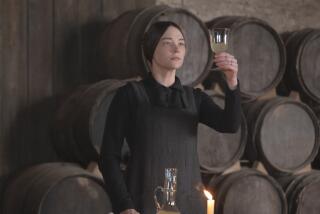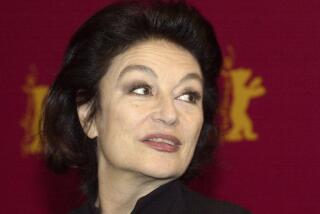Madeleine Renaud; Leading Actress of French Theater
- Share via
PARIS — Madeleine Renaud, a stage and screen actress for six decades who with her late husband, actor-director Jean-Louis Barrault, formed the First Couple of the French theater, died Friday at the American Hospital in Paris. She was 94.
She and Barrault, who died in January, were considered the French equivalent of America’s Alfred Lunt and Lynn Fontanne. Friends said Renaud had been in poor health since the death of her husband of 54 years.
Renaud was just 5 feet tall, but her stage presence and versatility were commanding.
She was known in America primarily for her appearance in the World War II saga “The Longest Day,” and for playing Maude in a U.S. touring company adaptation of “Harold and Maude,” in which she played the role of the funeral-going, romantic octogenarian made famous in film by Ruth Gordon.
“You have to have a heart and a soul to play Maude,” she told a French theater critic in 1977. “But don’t be mistaken, you’ve got to have muscle too.”
Although she had written short stories, plays and a novel as a girl, drama inspired her most, and she entered the Conservatory for the Performing Arts. Her performance in Moliere’s “School for Wives” earned her the conservatory’s top honor, and she joined the Comedie Francaise at 21.
A leading lady there for 24 years, she performed the French classic repertory of playwrights Racine, Corneille, Musset and Marivaux.
She married Barrault, 10 years her junior, in 1940. In 1947 they founded the popular Theatre de Marigny on the Champs Elysees, which played for a decade to audiences packed with artists, intellectuals and other celebrities.
After a brilliant decade at Marigny, the Renaud-Barrault troupe moved to the Theatre de l’Odeon, where they staged works by contemporary playwrights such as Jean Anouilh, Jean Giraudoux, Eugene Ionesco and Samuel Beckett.
Renaud adapted her melodious voice and delicate gestures to tragedy, comedy, and even vaudeville.
She appeared in such French films as “Jean de la Lune,” “La Maternelle,” “Maria Chapdelaine,” and “La Mandarine.”
More to Read
The biggest entertainment stories
Get our big stories about Hollywood, film, television, music, arts, culture and more right in your inbox as soon as they publish.
You may occasionally receive promotional content from the Los Angeles Times.










